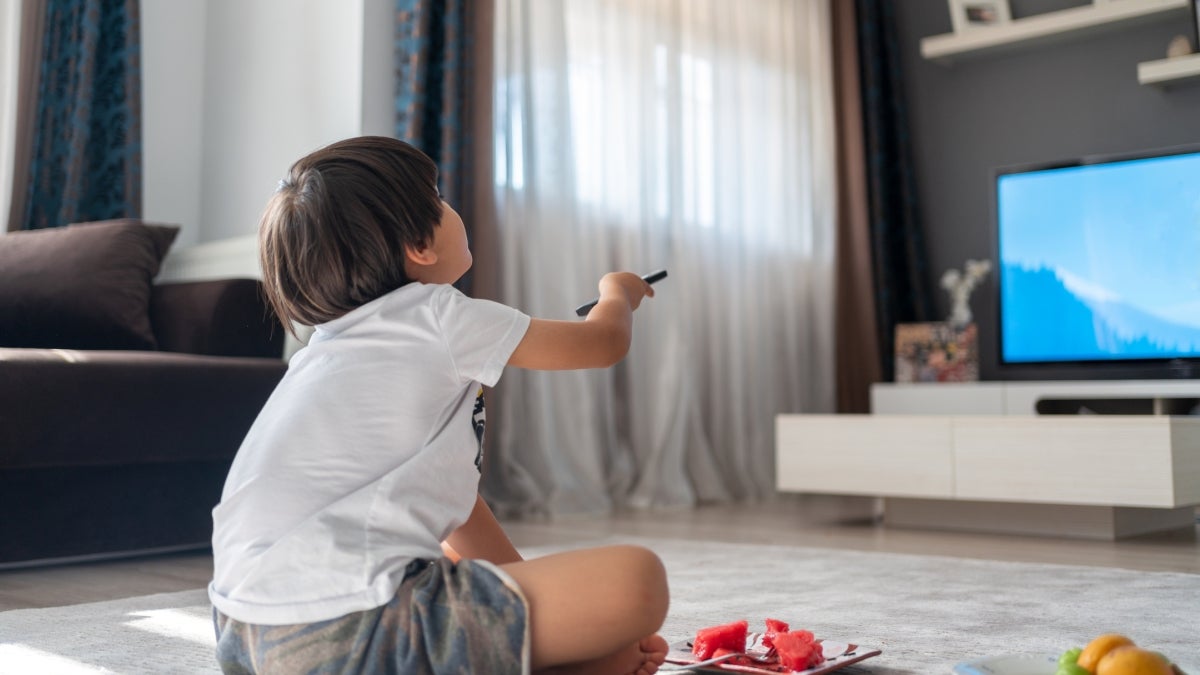More screen time for children this summer may not be a problem

iStock photo
Summer months can mean more screen time for kids who are out of school — and more concerned parents.
But according to a recent study co-led by ASU, the time spent on electronic devices may not be as harmful as caregivers think.
“Excessive screen time has been linked to a range of public health concerns, including sleep disruption, reduced physical activity, attention problems and difficulties in social and emotional development,” said Juyoung Kim, the principal investigator of a recently released study that she worked on while she was at Arizona State University.
The research examined screen time and, more importantly, content watched on electronic devices.
“But screen time isn’t necessarily harmful by default,” said Kim, who earned her PhD at the T. Denny Sanford School of Social and Family Dynamics. “While researchers generally agree that too much screen use can be detrimental, recent studies highlight the importance of a more nuanced approach. Factors such as the type of device, the content and the context of use all play important roles in shaping its effects on child development.”
According to the study, co-authored by Monica Tsethlikai, an associate professor at the Sanford School, educational content can have a positive impact on children and is associated with better executive function, which mediated better school outcomes.
In other words, watching 10 hours of mindless, looping TikTok videos is not the same as playing Minecraft — an engaging video game that provides opportunities to create elaborate kingdoms while learning team-building skills.
New slant on screen time
The study analyzed data that tracked nearly 1,500 South Korean children in third and fourth grade. The duration of screen time was measured by the average daily hours spent on smartphones, tablets and computers. The levels of engagement in recreational and educational screen time and executive function difficulties were assessed by primary caregivers, while school adjustment levels were measured by teacher reports.
Screen time studies have been around for as long as children have been captivated by screens. But Kim says hers is different.
“Many earlier studies focused mainly on how long children spend on screens, often overlooking the type of content they’re engaging with,” she said.
One of the most unexpected findings was that the amount of time spent on electronic devices was not significantly related to executive function or school adjustment.
“What surprised us most was that the total amount of screen time didn’t predict poorer school adjustment, which goes against many common assumptions,” Kim said. “It seems that it’s not just how much time children spend on screens, but what they do during that time that really matters.”
Educational vs. recreational content
But the results of the study are not as simple as they sound. What may be recreational for some may be educational for others.
“Some kids watch a lot of sports programming, and you may see that as recreational, but if you're a young man or woman who's really ... into sports and is watching the videos with the intention of learning to improve their skills, that's a very different type of watching,” Tsethlikai said.
Tsethlikai also said more and more adolescent boys are watching games because of the current trend of online sports betting, which is another problem.
“The results right now are really mixed. And that's one of the concerns. I think we need much more in-depth study in terms of what children are doing when they're on social media. It's not just how much time they’re spending and what they’re doing, but what their motivation is for doing what they're doing.”
Screening screen time
Parents can play an important role in helping children make good choices when deciding how to spend their tech time this summer.
Caregivers can use the findings from the study to guide their children toward age-appropriate, educational screen content that supports executive function. This might include apps or programs that promote active learning, creativity or problem-solving — like interactive science apps, virtual museum tours or educational videos designed for kids.
“Parents really need to know what their kids are doing online — especially their younger kids,” Tsethlikai said. “Make sure you have control over the apps that they're downloading.”
As for the time spent on screens, researchers say there is no one-size-fits-all solution. It’s important to focus on quality and balance. With the increasing diversity of screen use, it’s become harder to define how much screen time is too much. Even organizations like the American Academy of Pediatrics no longer recommend a strict daily limit. Instead, they suggest ensuring that screen time doesn’t interfere with sleep, physical activity, learning or face-to-face interactions.
Tsethlikai encourages caretakers to make sure children “have a good mix of both outdoor time and one-on-one time, and also have time to engage with peers.”
More Arts, humanities and education

ASU alum returns to home state, Gammage stage for 'Life of Pi' premiere
Arizona State University alum Toussaint Jeanlouis will be returning to Tempe on the "Life of Pi" national Broadway tour, where he voices and puppeteers the head of Richard Parker, the tiger, while…
ASU team implements offline digital library for orphanage, school in Kenya
Sunlight streamed through the windows of the second-story office, and a gentle wind rustled the curtains.It was 11 a.m. on a May Saturday in the small town of Lumakanda, located in a rural area of…

Passion for teaching is a family affair
Denise Bodman and Bethany Bustamante Van Vleet have strong family ties. Not only are they mother and daughter, they are both teaching professors at Arizona State University in the T. Denny…

